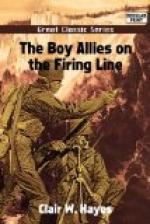“The best thing you can do now,” said Lieutenant Anderson to Hal finally, “is to get a little rest. Both of you are wounded, and will not have to report for duty. I shall tell General French that you will be all right in a day or two.”
“Tell him we shall be all right in an hour or two, that will be much better,” said Hal.
“Great Scott!” exclaimed the lieutenant. “Can’t you even keep still for a day?”
“Well,” said Hal, “there is likely to be some real fighting to-day, and we don’t want to miss anything, do we Chester?”
“I should say not,” was Chester’s reply.
CHAPTER IX.
To the Rescue.
“It looks rather awesome, doesn’t it?” said Chester.
“It certainly does,” was Hal’s reply.
The object of the boys’ conversation was a long armored train, which stood on a siding. It was late in the afternoon, and the two lads, after having taken a long rest, and being relieved from active duty by the express command of General French, had strolled up to the temporary siding, where the huge engine now stood puffing and snorting.
It was the first time either of the two boys had ever seen this rapidly moving vehicle of warfare. The open flat cars were protected by thick sheets of steel, behind which were mounted many small guns and rapid firers.
These armored trains already had given good accounts of themselves in other parts of the long line of battle, particularly in Belgium, in the earlier days of the struggle, and were things of terror to the German troops.
The train beside which the two lads now stood was ready for instant action. The gunners were at their posts, ready to go forward at a moment’s notice. The engineer and firemen stood beside the huge engine.
In the distance the sound of firing could be heard, and occasionally a shell burst close to where the boys were standing. But they had been through their baptism of fire, and paid little heed to these messengers of death.
“They say that these trains have proven immense factors in sudden raids on the enemy,” said Chester.
“Yes,” agreed Hal, “and it is easy to see that among light armed troops they could do great execution. It would even take very heavy artillery fire to make an impression on those steel sides. Besides—”
He broke off with a sudden exclamation.
“Look out,” he cried, and leaped back, pulling Chester forcibly along.
A second later and there was a terrific explosion. A German shell had burst within a few feet of where the two lads had been standing.
A crowd of troopers, who had been idling about a few yards from the train, disappeared with the deafening report, and when the smoke had cleared away they were nowhere to be seen. They had been blown to atoms.
The boys rushed forward, but, even as they did so, they halted at the sound of a sudden cry, and, turning their faces up the track, they beheld a mounted officer galloping swiftly toward them. An officer dropped off one of the cars of the train, which, fortunately, had not been touched by the explosion, and hurried to meet the newcomer.




